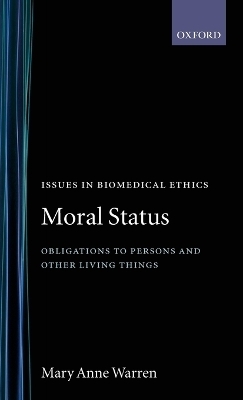
Moral Status
Obligations to Persons and Other Living Things
Seiten
1997
Oxford University Press (Verlag)
978-0-19-823668-9 (ISBN)
Oxford University Press (Verlag)
978-0-19-823668-9 (ISBN)
Investigates a theoretical question that is at the centre of practical and professional ethics: what are the criteria for having moral status? This work argues that no single property will do as a sole criterion, and puts forward seven basic principles which establish moral status.
Mary Anne Warren explores a theoretical question which lies at the heart of practical ethics: what are the criteria for having moral status? In other words, what are the criteria for being an entity towards which people have moral obligations? Some philosophers maintain that there is one intrinsic property--for instance, life, sentience, humanity, or moral agency. Others believe that relational properties, such as belonging to a human community, are more important. In Part I of the book, Warren argues that no single property can serve as the sole criterion for moral status; instead, life, sentience, moral agency, and social and biotic relationships are all relevant, each in a different way. She presents seven basic principles, each focusing on a property that can, in combination with others, legitimately affect an agent's moral obligations towards entities of a given type. In Part II, these principles are applied in an examination of three controversial ethical issues: voluntary euthanasia, abortion, and the moral status of animals.
Mary Anne Warren explores a theoretical question which lies at the heart of practical ethics: what are the criteria for having moral status? In other words, what are the criteria for being an entity towards which people have moral obligations? Some philosophers maintain that there is one intrinsic property--for instance, life, sentience, humanity, or moral agency. Others believe that relational properties, such as belonging to a human community, are more important. In Part I of the book, Warren argues that no single property can serve as the sole criterion for moral status; instead, life, sentience, moral agency, and social and biotic relationships are all relevant, each in a different way. She presents seven basic principles, each focusing on a property that can, in combination with others, legitimately affect an agent's moral obligations towards entities of a given type. In Part II, these principles are applied in an examination of three controversial ethical issues: voluntary euthanasia, abortion, and the moral status of animals.
PART I: AN ACCOUNT OF MORAL STATUS ; PART II: SELECTED APPLICATIONS ; BIBLIOGRAPHY. INDEX.
| Erscheint lt. Verlag | 13.11.1997 |
|---|---|
| Reihe/Serie | Issues in Biomedical Ethics |
| Verlagsort | Oxford |
| Sprache | englisch |
| Maße | 146 x 225 mm |
| Gewicht | 441 g |
| Themenwelt | Geisteswissenschaften ► Philosophie ► Ethik |
| Medizin / Pharmazie ► Medizinische Fachgebiete ► Medizinethik | |
| Studium ► Querschnittsbereiche ► Geschichte / Ethik der Medizin | |
| Sozialwissenschaften ► Soziologie | |
| ISBN-10 | 0-19-823668-9 / 0198236689 |
| ISBN-13 | 978-0-19-823668-9 / 9780198236689 |
| Zustand | Neuware |
| Haben Sie eine Frage zum Produkt? |
Mehr entdecken
aus dem Bereich
aus dem Bereich
Die Geschichte eines Weltzentrums der Medizin von 1710 bis zur …
Buch | Softcover (2021)
Lehmanns Media (Verlag)
17,95 €
Krankheitslehren, Irrwege, Behandlungsformen
Buch | Softcover (2024)
C.H.Beck (Verlag)
39,95 €


